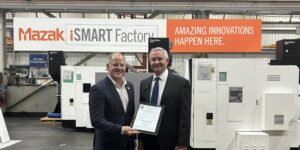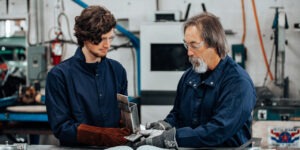Lincoln Electric and Case Western Team Up on Additive Manufacturing Project
Lincoln Electric and a group of partners have been awarded funding by America Makes to research proprietary laser-assisted, wire-based additive process for titanium and nickel-based alloys.
Posted: February 26, 2014
Lincoln Electric (Cleveland, OH) and a group of partners have been awarded funding by America Makes to benchmark metal-layering technology, using a Lincoln Electric-developed, laser-assisted, wire-based additive process, versus conventional additive-manufacturing technologies. Success in this effort can pave the way for new processes that benefit the U.S. manufacturing economy.
The $700,000 project, entitled High Throughput Functional Material Deposition Using a Laser Hot Wire Process, is funded by America Makes, a recently rebranded name for the National Additive Manufacturing Innovation Institute founded in August 2012. This public-private partnership, based in Youngstown, Ohio, is tasked with developing and accelerating additive manufacturing and 3D printing to help increase the nation’s global manufacturing competitiveness.
This project marks the second round of funding for the Case Western Reserve University and Lincoln Electric team by America Makes. It builds upon initial research by the team that yielded evidence that a wire-based, laser-assisted process is an effective metal cladding and layering method for repairs made to molds used in aluminum casting for the automotive industry.
The project features the firm as co-investigator along with the university, which also serves as administrative controller. Partnering companies include AZZ/WSI, Inc., rp+m, Inc., and RTI International Metals.
The roster of project participants represents a supply chain of material/consumable suppliers, machine manufacturers, process optimizers, workforce trainers and product validators/testers. “Complementing the goals of America Makes, Lincoln Electric is uniquely positioned to look at both the process side and the consumer side in terms of making an impact in additive manufacturing,” explains Tom Matthews, vice president of research and development at Lincoln Electric. “Our participation in this project speaks to the company’s leadership in developing automated manufacturing solutions leveraging our proprietary technology.”
While the laser-assisted, wire-based process was originally developed by Lincoln Electric for steel cladding, the process has shown potential for other alloys. In this second round, the process will be tested and benchmarked for generating structural parts with titanium alloys and functional surfaces with nickel-based alloys.
Success with titanium could be a huge boon to additive-manufacturing, as this material currently poses significant fabrication and repair challenges. While titanium is identified by the military, aerospace, medical and other industries as a critical part material due to its corrosion resistance, light weight and strength, it is also notoriously difficult to work with and inefficient.
For example, a finished part may have as much as 75 percent of the titanium machined away – a costly and time-consuming process resulting in significant waste. In addition, unlike aluminum and mild steel, titanium proves more costly to re-melt and re-use than other materials.
“The ultimate goal is to make a deposition process that is economical to use, can produce a competitive product by building up a structure or coating a surface, and achieves better performance for the customer,” explains Badri K. Narayanan, materials research group manager at Lincoln Electric, in describing the overall target of this research.
Delivering an efficient method of metal layering tightly meshes with the objectives of America Makes, which grew out of a presidential initiative to boost manufacturing prowess in the United States. To promote emerging additive-manufacturing research and technologies, America Makes works with industry and other organizations to bridge the gap between basic research and mature product development.














